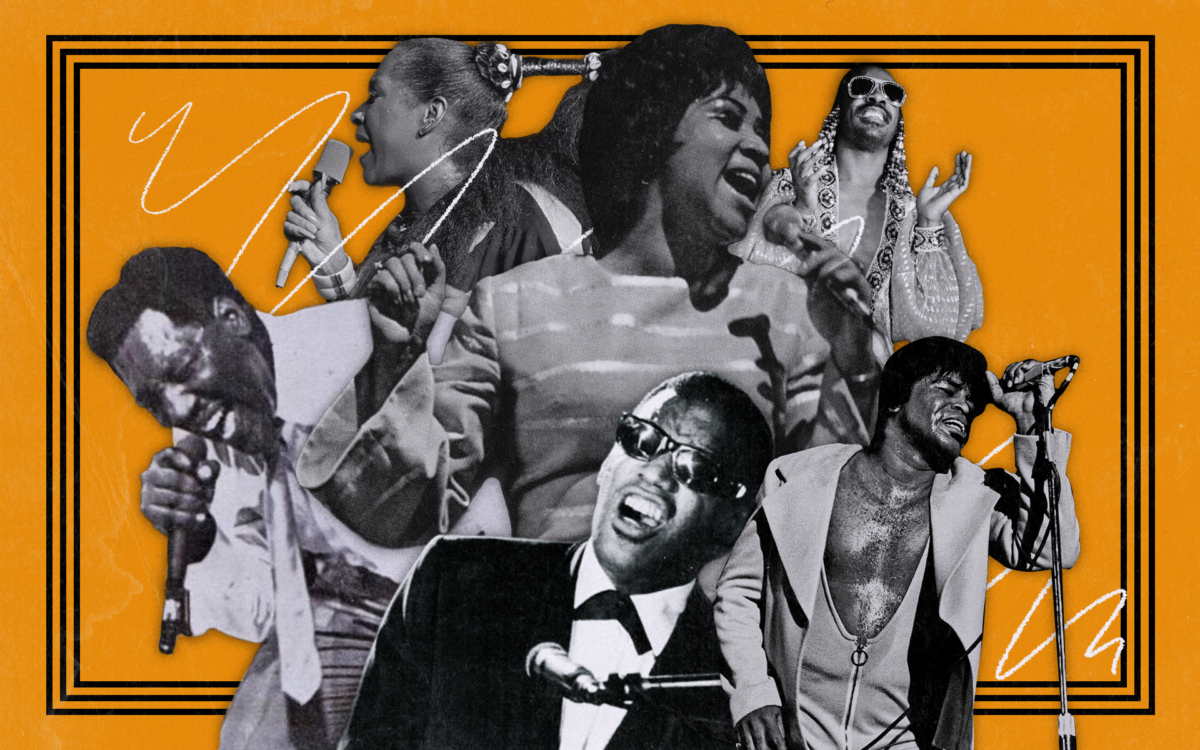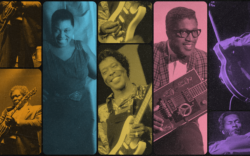What is soul music?
Soul music is a genre that emerged in mid-20th century America. Born in Black churches and nurtured on city streets, it has become one of the most powerful cultural forces of its time—and ours.
Soul music isn’t just something you hear; it’s something you feel. It reaches into the deepest parts of joy and pain, channeling the highs of love, the lows of heartbreak, and the weight of history into a sound that’s both raw and refined.
At its core, soul is the fire of gospel meeting the groove of rhythm and blues. The roots go deep, with early spirituals, work songs, blues, and jazz all stacked into this pot of what we now call soul.
The history of soul music
1950s: James Brown, Ray Charles, and Sam Cooke
It wasn’t until the late 1950s that soul began to crystallize into a distinct genre. Artists like James Brown, Ray Charles, and Sam Cooke are often credited as the genre’s pioneers—not just for their musical innovation, but for the emotional risks they took.
Ray Charles brought gospel phrasing into secular music, birthing an entirely new sound. Sam Cooke, with his golden voice and smooth delivery, showed that vulnerability and social commentary could coexist within the same melody, setting the tone for others to do the same. Meanwhile, James Brown’s legacy and longevity through eras gave him the unofficial title as the “Godfather of Soul”—he pioneered the genre and laid the groundwork for funk (and later hip hop) with his tight grooves and commanding performances.
1960s: Motown Records, Stax Records, and Atlantic Records
By the 1960s, soul was no longer confined to the margins. It was everywhere—on the radio, in dance halls, and increasingly, in the headlines.
The civil rights movement gave soul music a deeper resonance. Songs like “People Get Ready” by The Impressions and “A Change is Gonna Come” by Sam Cooke weren’t just hits—they were hymns for the hopeful, the grieving, and the rising.
Motown Records in Detroit brought soul to the mainstream with an unmistakable polish, with founder Berry Gordy creating a hit-making machine that rivaled the assembly lines of the city’s auto industry. The Motown sound was slick but heartfelt: catchy hooks, tight harmonies, and lyrics that masked complexity with charm. Marvin Gaye, The Supremes, Smokey Robinson, The Temptations, and Stevie Wonder didn’t just make music; they shaped pop culture and proved Black artists could dominate the global charts.
It can’t be understated that soul was the foundation for Michael Jackson, “The King of Pop,” who got his start with his brothers in the legendary family band, The Jackson 5 (later known as The Jacksons). He signed to Motown Records at the age of six, and as the frontman of the band, achieved their first hit single “I Want You Back” when he was only ten years old.
Further south, however, another strain of soul was brewing—one grittier, more gospel-soaked, and unfiltered. Stax Records in Memphis and Atlantic Records in New York gave us Otis Redding, Wilson Pickett, Carla Thomas, and the “Queen of Soul” herself, Aretha Franklin. With her thunderous voice and church-born phrasing, Aretha turned the word “respect” into a demand and a declaration.
At Stax, house band Booker T. & the MG’s created grooves so tight they barely needed vocals—yet when they backed Otis or Sam & Dave, the results were electric.
1970s: Philadelphia soul, social consciousness, and funk influences
As the 1970s dawned, soul music evolved again. Marvin Gaye asked, “What’s going on?”—a question that echoed the disillusionment of a generation facing war, poverty, and broken promises. Curtis Mayfield painted cinematic portraits of urban struggle and Black pride. Stevie Wonder used the synthesizer, not as a gimmick, but as a tool for storytelling.
Meanwhile, the Philadelphia soul sound added lush orchestration and smooth sophistication—thanks to producers Gamble and Huff and artists like The O’Jays, Teddy Pendergrass, Harold Melvin & The Blue Notes, Billy Paul, Patti LaBelle, and Lou Rawls.
Sly & The Family Stone played a pivotal role in the evolution of soul music by blending it with funk, rock, and psychedelic influences, helping to shape the sound of the late 1960s and early ’70s. As one of the first major bands to be racially integrated and include both men and women, they embodied the ideals of the civil rights era both musically and culturally.
Their groundbreaking hits like “Everyday People” introduced a new level of rhythmic complexity and social consciousness to popular music, laying the groundwork for future artists in soul, funk, and hip hop.
Then came the funk-infused era. James Brown, already considered the “Godfather of Soul,” leaned fully into funk in the ’70s, delivering rhythm-driven anthems like “Get Up Offa That Thing” and “The Payback,” which decades later became the foundation for the breakbeats in hip hop, drum and bass, and other sample-based genres.
1980s – 2000s: Subgenres (quiet storm, contemporary R&B, and neo soul)
In the 1980s, 1990s, and early 2000s, soul splintered into subgenres—quiet storm, contemporary R&B, neo soul—but its heart never stopped beating. Artists like Luther Vandross and Anita Baker carried the torch with elegance. And when Ms. Lauryn Hill dropped The Miseducation of Lauryn Hill, when D’Angelo released Voodoo, or during a legendary run by the Soulquarians—a collective containing the likes of The Roots, Erykah Badu, Common, J Dilla, Q-Tip, and many others—you could hear echoes of Marvin, Aretha, and Curtis in every note.
The ongoing legacy of soul music
Today, soul music lives on—not just as a retro sound, but as a living, breathing tradition. You hear it in the aching baritone of GIVĒON, the vintage stylings of Leon Bridges and Leon Thomas, and the spiritual intimacy of Cleo Sol.
And let’s not forget the genre-blurring genius of Anderson .Paak, who dances between eras with ease, or H.E.R. and Daniel Caesar, who bring guitar-driven storytelling back to the forefront.
What makes soul music timeless is its honesty. It’s music that doesn’t hide—music that feels. Whether it’s a whisper or a wail, or a falsetto run or a churchy shout, soul reminds us of our shared humanity. It’s Black joy, Black sorrow, Black excellence—and above all, Black resilience—put to melody.
To understand soul music is to understand a people, a struggle, and a celebration. It’s the sound of survival turned into beauty. And long after trends fade, soul will still be singing.
Try adding some soul influences into your own music with Splice’s library of royalty-free sounds:
June 28, 2025

.svg)
.svg)




